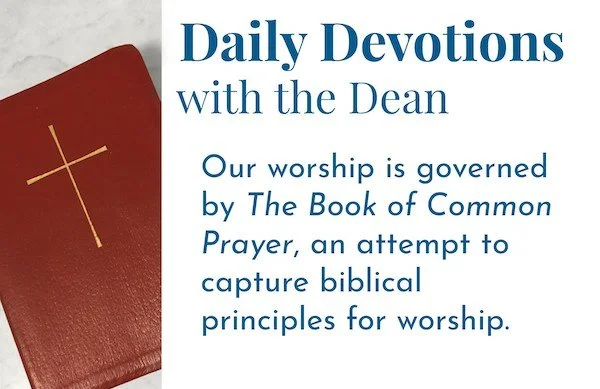Friday • 4/19/2024 •
Friday of the 3rd Week of Easter
This morning’s Scriptures are: Psalm 105:1–22; Exodus 24:1-18; Colossians 2:8-23; Matthew 4:12-17
This morning’s Canticles are: before the Psalm reading, Pascha Nostrum(“Christ Our Passover,” BCP, p. 83); following the OT reading, Canticle 10 (“The Second Song of Isaiah,” Isaiah 55:6–11; BCP, p. 86); following the Epistle reading, Canticle 18 (“A Song to the Lamb,” Revelation 4:11; 5:9–10, 13, BCP, p. 93)
Exodus 24 is a central passage in all of Scripture. Here in a worship service at the base of Mt. Sinai, God binds to himself in covenant the people he has redeemed. He briefly opens a window into the heart of worship, and from this passage we draw vital principles for worship. In fact, this passage accounts for why we do much of what we do in our worship at the Cathedral Church of St. Luke.
Worship has a script. It’s not free form. Worship happens at God’s own invitation, and on his terms. Yahweh, the redeeming God of Israel has brought this people out of Israel for fellowship with himself. He has promised to make them a kingdom of priests and a holy nation, and through them to bless the entirety of the human race. And so he is calling the shots.
The Lord calls for the placing of twelve pillars to represent the tribes, and for the building of an altar for sacrifice. He orchestrates the readings and the sacrifices, and twice he evokes from the people, “All that the Lord has spoken we will do….” In the same spirit, our worship is governed by The Book of Common Prayer, an attempt to capture biblical principles for worship. In a nutshell, those principles are: we gather in God’s holy presence; we proclaim his Holy Word; we feast at the Table of the Lord; and we are sent into the world for ministry.
Worship consists of a ministry of word… Twice on this holy mountain there is a generous reading of God’s Word: “all the words of Yahweh and all the ordinances” (Exodus 24:3) … “Then he took the book of the covenant, and read it in the hearing of the people” (Exodus 24:7). That reading likely consisted of the “Ten Words” that had been delivered to Moses in Exodus 20, plus the unpacking of the “Ten Words” in Exodus 21-23. There the deep principles of loving God and loving neighbor had been applied to various situations, like treating slaves justly, dealing with violent crime, providing restitution in cases of theft or accidental harm, caring for the poor.
In worship, we attend diligently to God’s Holy Word because we are determined to honor him in our lives. Then, in response to his Word, we recite the Nicene Creed, the faith that all believers hold together. There we are adding our own: “All that the Lord has spoken….”
Worship, then, consists of a ministry of word…AND a ministry of sacred action. Symbolic actions in this passage include “Burnt offerings” … “offerings of well-being” (literally, “peace offerings”) … “blood dashed against the altar” … “blood dashed on the people.” It all culminates in this extraordinary phenomenon: “Also they beheld God, and they ate and drank.” By God’s mysterious economy, “the blood of the covenant” (Exodus 24:7) does two things. First, it averts deserved judgment. Second, it establishes divine fellowship. And that fellowship climaxes in a shared meal in the very presence of God.
At his Last Supper with his disciples, Jesus recalls this Mt. Sinai experience when he says “this is my blood of the covenant” (Matthew 26:28). With these words in our celebration of Eucharist, we place ourselves at the foot of the holy mountain, sharing with one another the sacred meal, hosted by the mediator of the New Covenant.
I close today with the elegant and powerful post-communion prayer from the 5th century Syriac Liturgy of Malabar:
Grant, O Lord Jesus,
that the ears which have heard the voice of your songs
may be closed to the voice of dispute;
that the eyes which have seen your great love
may also behold your blessed hope;
that the tongues which have sung your praise
may speak the truth in love;
that the feet which have walked in your courts
may walk in the region of light;
and that the bodies which have received your living body
may be restored in newnesss of life.
Glory to you for your inexpressible gift. Amen.
Be blessed this day.
Reggie Kidd+



